#Joe Ansolabehere
Explore tagged Tumblr posts
Text


21 years ago today Lilo & Stitch: The Series premiered on ABC!!!🤩🤩🤩
I loved this show to death, I still do actually!!! I have a lot of lilo & stitch stuff in my room!!!
😊😊😊



#lilo and stitch#lilo & stitch#kim possible#recess#american dragon jake long#the proud family#abc#the disney channel#Christopher Michael Sanders#Bob Schooley#Mark McCorkle#Paul Germain#Joe Ansolabehere#Bruce W. Smith#Jeff Goode#video
17 notes
·
View notes
Photo
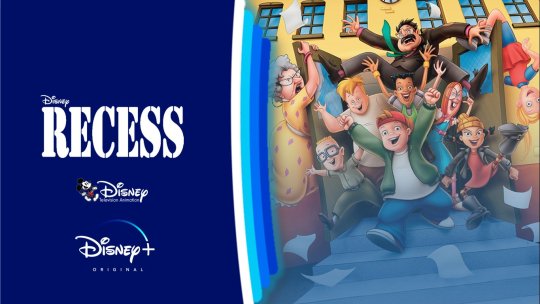
RUMOR: Recess Revival/Reboot In Development At Disney Television Animation For Disney+
Coming off the fresh of Phineas And Ferb getting a revival with two new seasons and Kim Possible rumored to have a revival film, it seems that the next Disney TVA property to come back will be the gang at Third Street Elementary School located in Arkansas as Disney might plan a revival/reboot of the beloved late 90s and early 2000s series Recess with og creators Paul Germain and Joe Ansolabehere on board.
In a Interview with Slasher Film, Joe Ansolabehere revealed that since 2019, Disney has been in talks with them for a potential comeback of the show with the developing process taking place since 2020.
As for "Recess," the show may be coming back sooner or later. After both "Rugrats" and "Hey Arnold" were brought back to our screens, Ansolabehere confirms there have been talks about a "Recess" reboot, and he's been developing it with Paul Germain the last couple of years. "We've come up with several different angles and we've tried different things. It's been four years that we've been working on it," Ansolabehere said. "But that's an example of how things have changed ... things are slower." No matter how long it takes, however, this is exciting news for any kid who grew up watching cartoons in the early '00s.
If Greenlight the “Recess” revival will join fellow legacy Disney Television Animation IPs in returning to our screens to get a revival/reboot to a new generation with the IPs being “The Proud Family” with “The Proud Family Louder And Prouder”, “Phineas And Ferb” with a Season 5 & Season 6 renewal,”Sofia The First” with a new spin-off series under the working title of “Royal Prep Academy”,”Darkwing Duck” with a new series from Point Grey Pictures with also having early but very early talks of a potential “TaleSpin” reboot and “Kim Possible” with a potential revival/reunion film as backdoor to a new sequel series.
#Recess#Disney Recess#Recess Revival#Paul Germain#Joe Ansolabehere#Disney+#Disney Plus#Disney+ Originals#Disney Plus Originals#Disney+ Original Series#Disney Plus Original Series#Disney+ Original Animated Series#Disney Plus Original Animated Series
103 notes
·
View notes
Note
So what would you love to see for Disney TVA's 40th next year? asking this in terms of celebration from Disney themselves
I would love to see more greenlights for new shows many from BCG crew members, in terms of reboots i think there should be official PRs for the TaleSpin and Recess reboots but specially would love to see series greenlight order for C.H. Greenblatt - Disney Channel series, i think he really deserves to find sucess at Disney.
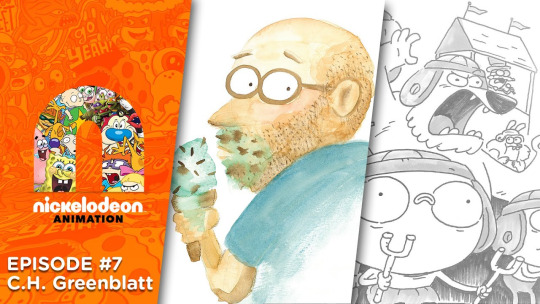
Speaking of D23 Expo, would love to see Disney Legends Awards giving awards to Tad Stones, Bob Schooley, Mark McCorkle, Rob LaDuca, Bob Roth , Bill Motz, Paul Germain, Joe Ansolabehere, Dan Povenmire, Jeff Swampy Marsh, Jose Zelaya, Bobs Gannaway, Craig Gerber,Mark Seidenberg, Paul Rudish and Noah Z. Jones for their contributions on the studio over it's 40 years.
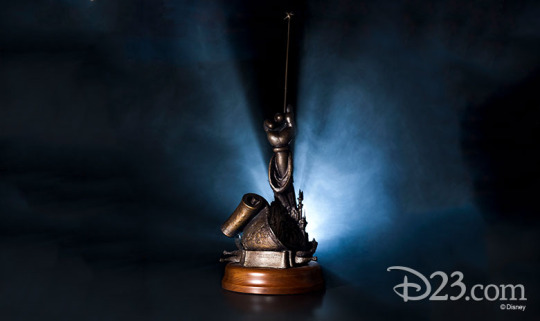
Would love to see something akin to Once Upon a Studio, my perfect idea would be Mickey and the entire characters of the studio getting ready to welcome to StuGo, Sam Witch, North Woods, Dog & Frog, Fantasy Sports, Neon Galaxy, InterCats, Rhona, Witchverse, Dusty Dupree, Cookies & Milk, North Woods, Tiny Trailblazers casts on a big party for the 100 series and next 100 shows.
Finally would love to see Very Important House getting revived this time for Disney Channel as next year is also the 10th anniversary of the pilot getting picked up for Disney XD
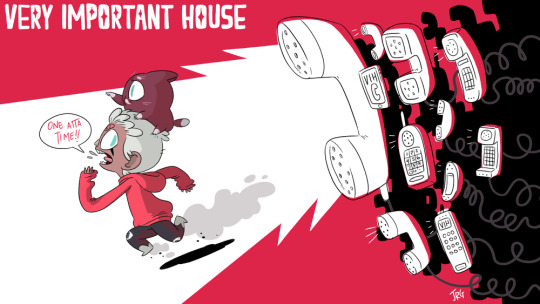
Finally something like Wish did with it's end credits with each show created at Disney TVA on the credits of The School Of Sensitive Souls.
2 notes
·
View notes
Text
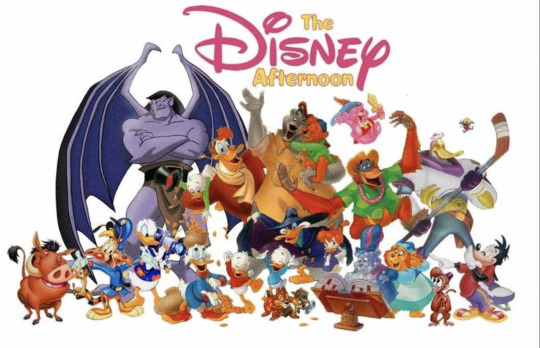
I've been on a slight classic Disney TV Animation kick.
I'm talking mid-1980s to early 1990s era DTVA... The era of DUCKTALES, CHIP N' DALE RESCUE RANGERS, TALESPIN, DARKWING DUCK, etc. I loved these shows as a kid, as I caught the many re-runs of them on Toon Disney in the late '90s when staying over my grandparents' house during the summer days before my mum got home from work.
And the funny thing is, when reading up on these shows and their histories... If a ton of these shows were being made today? I think they'd be met with a lot of doubt and skepticism on the Internet...
Like... "TALESPIN? Wtf is this? JUNGLE BOOK characters as cargo pilots in an INDIANA JONES-esque adventure setting? Chip and Dale lookin' like Indiana Jones and Magnum P.I.? Trying too hard to be relevant and cool. So dated! A Disney cartoon about Gummi Bears??? A candy??? Disney is totally out of ideas, man-"
And yet, the fledgling division - a brainchild of the newly-arrived CEO Michael Eisner, who saw that Disney had long barely contributed to the world of episodic television animation - went through with these shows circa 1985-1993... They came out, kids and audiences watched them, they all did very well, are fondly-remembered favorites of American animation's 2nd Golden Age. The early batch of shows arguably changed the game for TV animation in the states, which was by then soaked in toy commercials and cliche kidvid stuff.
And I almost get the feeling that once the Golden Age went full-throttle with the advent of THE SIMPSONS, Nickelodeon's "Nicktoons", Warner Animation's offerings (many of which involving Steven Spielberg!), MTV's groundbreaking adult cartoons, and many more, Disney TV Animation did have some re-routing. The early '90s was a kind of weird era for them, when they put out shows like BONKERS, RAW TOONAGE, and THE SCHNOOKUMS AND MEAT FUNNY CARTOON SHOW. The game was changing fast, and soon they were wowing once more with the likes of GARGOYLES, and venturing into other territory with shows like PEPPER ANN. They'd get creators of shows that were hits on other networks, such as Paul Germain from RUGRATS, who co-created RECESS with Joe Ansolabehere, who had previously worked on another iconic Nick show, HEY ARNOLD!
Kinda makes me think of where Disney Animation has been for a bit these past few years, in an era where the mainstream feature animation game is changing fast. And how! And it's not that what they do is bad or - as largely insufferable people say - "mid". Release something like ENCANTO or RAYA AND THE LAST DRAGON or even STRANGE WORLD in 2015, it'd be praised, most people would be in agreement, "Yeah, another strong entry from the revitalized WDAS." Of course, RAYA and ENCANTO enjoyed solid reviews and excellent streaming results, and STRANGE WORLD even got pretty passing grade reviews (whereas something like the MARIO movie... Didn't. Funny how that works), but large chunks of weird animation fans on the internet seem to think they're all just "mid" or whatever... It's some console wars-caliber nonsense, I think, that's reductionist. If I didn't like something, I still acknowledge the hard work put in by the filmmakers/crew (especially crucial amidst the writer and actors' strike), and go about my day. I'm not pitting STRANGE WORLD against PUSS IN BOOTS 2, for sure. There's no reason for me to do so.
I thought about how in ANIMANIACS, they took potshots at BONKERS. The same era as "SEGA does what NintenDON'T." Those extreeeeeeme aaaaattitude '90s!
I know, because I lived most of that decade.
BONKERS is a show that fascinates me (I recently wrote a little thing about it on my main tumblr), and I thought while watching it... Release this show in 1988, and *not* 1993, it's likely hailed as groundbreaking. A cartoon trying to be zany and fun like 1940s Tex Avery cartoons, visually satisfying and nicely realized, and much more original than - say - the umpteenth CARE BEARS cartoon or the new Hanna-Barbera ersatz Scooby-Doo stuff. But, post-TINY TOONS, post-REN & STIMPY, and sitting next to ANIMANIACS, it seemingly just could not compare. It also didn't help that it was heavily inspired by the amazing film that is WHO FRAMED ROGER RABBIT, its characters and premise ostensibly being a replacement for a property Disney could no longer do stuff with because of their feud with co-owner Spielberg. (Which puts TINY TOONS and ANIMANIACS' potshots at Disney and BONKERS, respectively, into perspective.)
Similarly, Hanna-Barbera - long one of the studio names synonymous with TV animation in America - were in an odd place themselves, until they - under the stewardship of one Fred Seibert - began bringing in some incredible talent like Genndy Tartakovsky, Paul Rudish, Rob Renzetti, to name a few... We had moved away from the likes of YO YOGI!, TOM AND JERRY KIDS, and SIMPSONS-chasing "adult" cartoons like CAPITOL CRITTERS and FISH POLICE... 2 STUPID DOGS, which had been dismissed as a REN & STIMPY wannabe by some folks back in the day, was really a launchpad for those talents. And soon, Hanna-Barbera Productions was rockin' the mid-to-late '90s with all the iconic Cartoon Network shows we all know and love... Kinda makes me think of how Illumination gets looked at, they've been around for some time and they "churn out" stuff that's just "mid" or "bland" or whatever, but I think post-SING 2, post-MINIONS 2, there's a sort-of newfound appreciation for them in some circles. Somewhat. SUPER MARIO BROS. MOVIE got a pass from a lot of people engaging in these weird console wars, despite its middling critical reception and a lot of folks saying it actually wasn't good. (I liked it fine, but I felt it was more a "Mario's Greatest Hits" showcase than an actual movie.) But, Illumination has an adult animation division (Moonlight) firing up, some pretty dynamic side projects and shorts, too. They even got talent like Benjamin Renner, who directed the upcoming MIGRATION. They're doin' something right if they got him.
I think, more than anything, things change so fast in entertainment. Tastes change, things trend, animated movies take a while to come out and are largely determined at a stage long before a print (or digital file) of the finished film projects onto a screen somewhere. How does one know what the world looks like, culturally, five years after they have started their film? Let alone 2 years? It's why I don't pile on films like ELEMENTAL, STRANGE WORLD, LIGHTYEAR, RUBY GILLMAN, et al losing money. They seemed surefire when they signed off on them, and like William Goldman said... No one knows anything!
I dunno, I thought I'd just relate some current feature animation things to what was happening in TV animation some 30 years ago... all because I was watching TALESPIN and BONKERS and such-
4 notes
·
View notes
Text

“Marion” is a story about the only female bull-jumper in France, Caroline Nogues-Larbere. Who knew that France had a sport called “La Course Landaise,” which looks a lot like a bullfight, except that the bullfighters don’t kill the bull but simply jump out of the way of the charging animal? Joe Weiland and Finn Constantine directed the story of Caroline, here called Marion, and the 13’ 16” short was executive produced by Sienna Miller and Cate Blanchett. WRITER/DIRECTORS Joe Weiland was BAFTA nominated for his first short, “Gorka,” and has won the Young Director Awards at Cannes. Constantine is affiliated with the art magazine “Plaster” but is moving into film. CAST The attractive Marion is shown donning her "suit of lights" for facing down the bull, assisted by a member of Team Nogues in the locker room. When Marion's husband shows up at the arena with their daughter, saying he cannot watch the child, Marion is forced to park the young girl in the locker room with directions not to leave (which, of course, she does.) There is some harrowing footage of Marion being dragged by a bull and the refrain “Protect her; watch over her” echoes throughout the intense face-off with the charging animal. We also see the other members of Team Nogues in the locker room: Matthew Nogues, Nicolas Vergonzeanne, Romain Beyris, Kevin Ribeiro, Louis Ansolabehere, Gilles Beguery and Frederic Vergonzeanne. CONCLUSION The only female bull-jumper in France had never acted before, but she was a strikingly beautiful and courageous athlete facing down an animal easily 5 times her size. It was interesting to learn of this previously unknown-to-me French version of bullfighting. I would not be surprised to see Caroline Nogues-Larbere in another future vehicle. I did wonder how Sienna Miller and Cate Blanchett got involved in the production of this interesting short. There were many unusual dimensions to the quasi-bullfighting sport (people on stilts in the arena?) and the misogyny that seems on the increase in the world was in evidence in the Team Nogues locker room. (Murmurs of "She shouldn't be here.") An interesting and tension-filled short. Read the full article
0 notes
Photo

RUMOR: Recess Revival/Reboot In Development At Disney Television Animation For Disney+ Coming off the fresh of Phineas And Ferb getting a revival with two new seasons and Kim Possible rumored to have a revival film, it seems that the next Disney TVA property to come back will be the gang at Third Street Elementary School located in Arkansas as Disney might plan a revival/reboot of the beloved late 90s and early 2000s series Recess with og creators Paul Germain and Joe Ansolabehere on board. In a Interview with Slasher Film, Joe Ansolabehere revealed that since 2019, Disney has been in talks with them for a potential comeback of the show with the developing process taking place since 2020. As for "Recess," the show may be coming back sooner or later. After both "Rugrats" and "Hey Arnold" were brought back to our screens, Ansolabehere confirms there have been talks about a "Recess" reboot, and he's been developing it with Paul Germain the last couple of years. "We've come up with several different angles and we've tried different things. It's been four years that we've been working on it," Ansolabehere said. "But that's an example of how things have changed ... things are slower." No matter how long it takes, however, this is exciting news for any kid who grew up watching cartoons in the early '00s. If Greenlight the “Recess” revival will join fellow legacy Disney Television Animation IPs in returning to our screens to get a revival/reboot to a new generation with the IPs being “The Proud Family” with “The Proud Family Louder And Prouder”, “Phineas And Ferb” with a Season 5 & Season 6 renewal,”Sofia The First” with a new spin-off series under the working title of “Royal Prep Academy”,”Darkwing Duck” with a new series from Point Grey Pictures with also having early but very early talks of a potential “TaleSpin” reboot and “Kim Possible” with a potential revival/reunion film as backdoor to a new sequel series. https://www.instagram.com/p/CqAbglBtEZoqYV6lTmNKNa4rVJyS5RXZ8TtJho0/?igshid=NGJjMDIxMWI=
0 notes
Photo
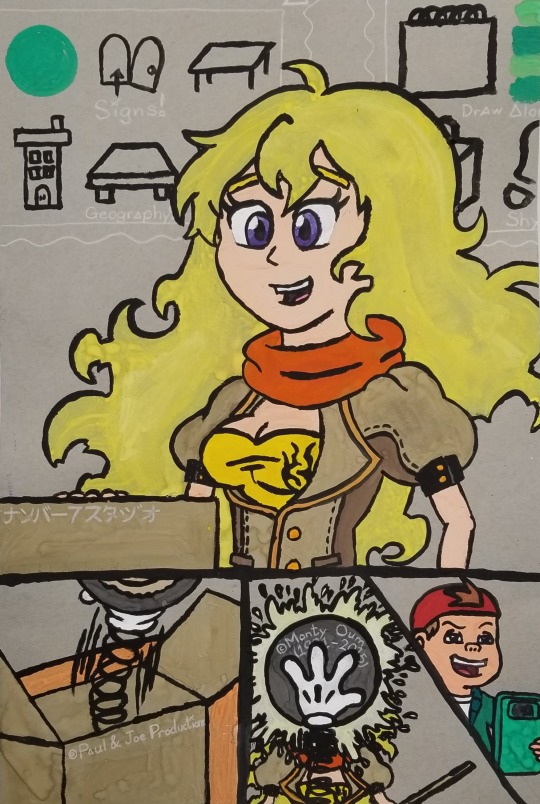
Caption My Comic Challenge #01 by Numbuh7Studios
Even though this is an old comic that I made with all the hard work back in Spring 2018, this is just something that I want you to do. This is a challenge where anyone of you can caption this comic for me. I know that I didn't post any RWBY fanart in a while, but this was a time that I was into that web series. So hope all of you enjoy this while you can.
RWBY — © Rooster Teeth Animation Blue's Clues (Mentioned) — 9 Story & Nickelodeon Disney's Recess — © Paul & Joe Productions & Disney Television Animation
Deviantart: https://www.deviantart.com/numbuh7studios
#yang xiao long#rwby#monty oum#Rooster Teeth#tj detweiler#disney’s recess#paul germain#joe ansolabehere#walt disney studios
5 notes
·
View notes
Text
My Top 25 Animated Favorite TV Show Creators
My Top 25 Animated Favorite TV Show Creators
25. Mr. Warburton (Known For Creating Codename: Kids Next Door)
24. Maxwell Atoms (Known For Creating The Grim Adventures Of Billy And Mandy)
23. John A. Davis (Known For Creating The Adventures Of Jimmy Neutron: Boy Genius)
22. Luke Pearson (Known For Creating Hilda)
21. Glen Murakami (Known For Creating Teen Titans Along With Sam Register)
20. Dan Povenmire and Jeff "Swampy" Marsh (Known For Creating Phineas And Ferb And Milo Murphy's Law)
19. C. H. Greenblatt (Known For Creating Chowder And Harvey Beaks)
18. Ben Bocquelet (Known For Creating The Amazing World Of Gumball)
17. Daniel Chong (Known For Creating We Bare Bears)
16. Sandro Corsaro (Known For Creating Kick Buttowski: Suburban Daredevil)
15. Daron Nefcy (Known For Creating Star Vs. The Forces Of Evil)
14. Matt Braly (Known For Creating Amphibia)
13. Butch Hartman (Known For Creating The Fairly OddParents, Danny Phantom, T.U.F.F Puppy, And Bunsen Is A Beast)
12. Rob Renzetti (Known For Creating My Life As A Teenage Robot)
11. Sam Register (Known For Creating Hi Hi Puffy AmiYumi, Transformers Animated, Teen Titans, And The Looney Tunes Show)
10. Mike Judge (Known For Creating Beavis And Butthead And King Of The Hill)
9. Matt Groening (Known For Creating The Simpsons, Futurama, And Disenchantment)
8. Seth MacFarlane (Known For Creating Family Guy, American Dad, And The Cleveland Show)
7. Craig McCracken (Known For Creating The Powerpuff Girls, Foster's Home For Imaginary Friends, Wander Over Yonder, And Kid Cosmic)
6. Genndy Tartakovsky (Known For Creating Dexter's Laboratory, Samurai Jack, Sym Bionic Titan, Primal, And Unicorn: Warriors Eternal)
5. Arlene Klasky (Known For Creating Rugrats, All Grown Up, Duckman, The Wild Thornberrys, And Rocket Power)
4. Gábor Csupó (Known For Creating Rugrats, All Grown Up, Duckman, The Wild Thornberrys, Aaahh!!! Real Monsters, And Rocket Power) 3. Alex Hirsch (Known For Creating Gravity Falls)
2. Boo Kyoung Kim & Calvin Kim (Known Fir Creating Pucca)
And 1. Stephen Hillenburg (Known For Creating Spongebob Squarepants)
Honorable Mentions: Rebecca Sugar, Pendleton Ward, Ian Jones-Quartey, Paul Germain, Joe Ansolabehere, Danny Antonucci, Kyle Marshall, Jan Van Rijsselberge, Olivier Jean-Marie, Jean-Yves Raimbaud, Matt Burnett, Ben Levin, Dan Schneider, Diego Molano, Greg Miller, Joe Murray, Thurop Van Orman, Dave Wasson, J. G. Quintel, Kyle Carrozza, Parker Simmons, Bob Boyle, & Paul Rudish
Credit Goes To candialva11
Original Meme Template: https://www.deviantart.com/candialva11/art/My-top-25-favorite-blank-meme-template-892955464

7 notes
·
View notes
Photo

Joe Murray (Rocko’s Modern Life), Joe Ansolabehere (Recess), and me (CatDog). #Nickelodeon #nickelodeonanimation #disney #animation #catdog #rockosmodernlife #recess https://www.instagram.com/p/B2okwddA140/?igshid=1ka14scnmmpbf
14 notes
·
View notes
Photo

Disney Junior - Miles From Tomorrowland - How I Saved My Summer Vacation - Adapted by Sheila Sweeny Higginson - Based on the episode written by Joe Ansolabehere - for a series created by Sascha Paladino - World of Reading Level 1 - 2016 Disney Press - ISBN: 978-1-4847-2962-5 From the episode: Miles From Tomorrowland S01E4b How I Saved My Summer Vacation - February 6, 2015 #disneyjunior #disney #tomorrowland #milesfromtomorrowland #howispentmysummervacation #howisavedmysummervacation #cartoons #cartooncharacters #summervacation #beach #voyalaplaya #playa #waltdisney #buzzlightyearofstarcommand #tomorrowlandtransitauthority #missionforceone #callistofamily #phoebecallisto #olivamunn #merc #stella #milescallisto #watsonandcrick #thecallistos #ruggles #lorettacallisto #tomkenny #robots #robotsofinstagram #ostrich #roboostrich (at Portland, Oregon) https://www.instagram.com/p/BxtGXLwheXC/?igshid=c9o3rv4hbspz
#disneyjunior#disney#tomorrowland#milesfromtomorrowland#howispentmysummervacation#howisavedmysummervacation#cartoons#cartooncharacters#summervacation#beach#voyalaplaya#playa#waltdisney#buzzlightyearofstarcommand#tomorrowlandtransitauthority#missionforceone#callistofamily#phoebecallisto#olivamunn#merc#stella#milescallisto#watsonandcrick#thecallistos#ruggles#lorettacallisto#tomkenny#robots#robotsofinstagram#ostrich
1 note
·
View note
Text
27 years ago today Recess premiered on ABC!!!🔴🔴🔴
I loved this show to death!!!
The movie was great too!!!
❤️🔥❤️🔥❤️🔥❤️🔥❤️🔥❤️🔥❤️🔥❤️🔥❤️🔥❤️🔥❤️🔥
1 note
·
View note
Photo




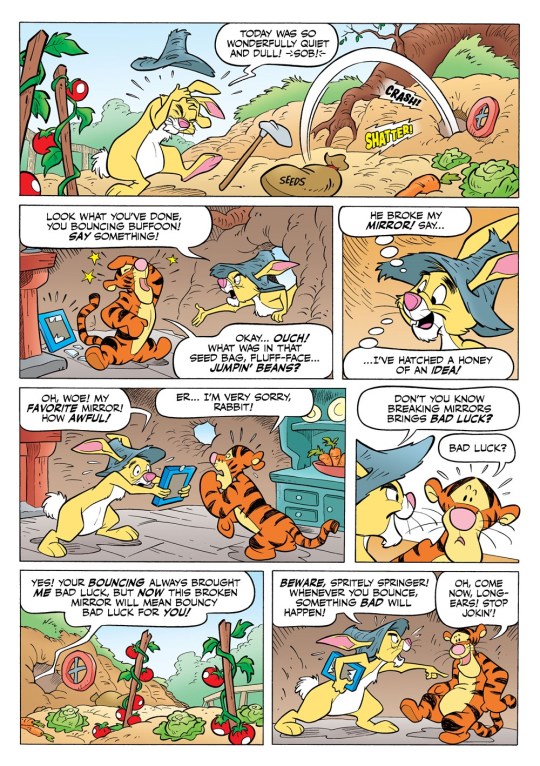

Disney Publishing Worldwide Sets May Release Date For Comic Book Compilation “ Disney One Saturday Morning Adventures”
Monday morning, wake up time
Get to work and stand in line
What would make you feel real fine? One Saturday Morning!
Pour a bowl of cereal and dig into a nostalgic comics tribute to Disney's One Saturday Morning!
Disney Publishing Worldwide has announced the release for Disney’s One Saturday Morning Adventures an upcoming comic book compilation featuring all the comics from Disney’s One Saturday Morning shows featured 30 years ago on Disney Adventures Magazine slated for May 16, 2023.
Fans of these TV shows and comics have been asking for them for years. They’ve been uncollected and unavailable for decades.
Disney One Saturday Morning Adventures
Disney Deluxe
May 16, 2023
Disney Publishing Worldwide
Disney Press
by Daan Jippes, Laura McCreary, Scott Gimple
From Disney Adventures and its sister magazines come classic comics based on your favorite 1990s Saturday morning cartoon block! See sideways schoolkids Doug and Pepper Ann navigate the halls of tween angst—while sneaky Spinelli of Recess is always up to tricks! Join Buzz Lightyear of Star Command and Mira Nova for big space battles. Then return to the Hundred Acre Wood for The New Adventures of Winnie the Pooh… and hit Mouseton for Mickey, Goofy, and (hot-cha-cha!) Mortimer in Mickey Mouse Works! Even the Emmy-Award-winning Teacher’s Pet is back in comics… back in print for the first time in decades!
Nostalgia: Parents who grew up watching the these Saturday morning cartoons, movies in the theater, and reading these comics off the newstands, are still watching these shows on Disney+ with their own children. Merch with the classic character designs is still available.
#Doug#Disney Doug#Pepper Ann#Recess#Disney Recess#The New Adventures Of Winnie The Pooh#Mickey Mouse Works#House Of Mouse#Teacher's Pet#Disney Teacher's Pet#Disney's One Saturday Morning#Disney's 1 Saturday Morning#ABC Network#Jim Jinkins#Sue Rose#Paul Germain#Joe Ansolabehere#Tad Stones#Bob Schooley#Mark McCorkle#Bobs Gannaway#Tony Craig#Gary Baseman#Disney Publishing Worldwide#Disney Publising Worldwide Books#Disney Press#Disney Deluxe
83 notes
·
View notes
Note
Why Disney D23 dosn't give Disney TVA Creators some of the Disney Legend Awards?
Good Question! if i had to make a guess i could be........... actually no idea since some Disney Animators from Disney & Pixar get the award to and i always wondered why they leave Disney TVA creators behind, i guess in the 2022 edition we will probably get Matt Groening as the next one
Okay jokes aside.
If it was my choice i will the award to
Tad Stones
Greg Weisman
Jymn Magon
Robert Taylor
Michael Peraza
Jim Jinkins
Paul Germain
Joe Ansolabehere
Bob Schooley
Bobs Gannaway
Mark McCorkle
Dan Povenmire
Jeff "Swampy" Marsh
Noah Z Jones
Alex Hirsch
Chris Houghton
Shane Houghton
5 notes
·
View notes
Text
Looking forward to a panel discussion next week with my mindbendingly creative friends Joe Ansolabehere, Craig Bartlett, Pete Gaffney, Holly Huckins, Rachel Lipman, Matt Negrete - and - we’re hoping - Sue Rose.

2 notes
·
View notes
Text

“Marion” is a story about the only female bull-jumper in France, Caroline Nogues-Larbere. Who knew that France had a sport called “La Course Landaise,” which looks a lot like a bullfight, except that the bullfighters don’t kill the bull but simply jump out of the way of the charging animal? Joe Weiland and Finn Constantine directed the story of Caroline, here called Marion, and the 13’ 16” short was executive produced by Sienna Miller and Cate Blanchett. WRITER/DIRECTORS Joe Weiland was BAFTA nominated for his first short, “Gorka,” and has won the Young Director Awards at Cannes. Constantine is affiliated with the art magazine “Plaster” but is moving into film. CAST The attractive Marion is shown donning her "suit of lights" for facing down the bull, assisted by a member of Team Nogues in the locker room. When Marion's husband shows up at the arena with their daughter, saying he cannot watch the child, Marion is forced to park the young girl in the locker room with directions not to leave (which, of course, she does.) There is some harrowing footage of Marion being dragged by a bull and the refrain “Protect her; watch over her” echoes throughout the intense face-off with the charging animal. We also see the other members of Team Nogues in the locker room: Matthew Nogues, Nicolas Vergonzeanne, Romain Beyris, Kevin Ribeiro, Louis Ansolabehere, Gilles Beguery and Frederic Vergonzeanne. CONCLUSION The only female bull-jumper in France had never acted before, but she was a strikingly beautiful and courageous athlete facing down an animal easily 5 times her size. It was interesting to learn of this previously unknown-to-me French version of bullfighting. I would not be surprised to see Caroline Nogues-Larbere in another future vehicle. I did wonder how Sienna Miller and Cate Blanchett got involved in the production of this interesting short. There were many unusual dimensions to the quasi-bullfighting sport (people on stilts in the arena?) and the misogyny that seems on the increase in the world was in evidence in the Team Nogues locker room. (Murmurs of "She shouldn't be here.") An interesting and tension-filled short. Read the full article
0 notes
Video
youtube
Straight from the series creators - Paul Germain & Joe Ansolabehere - mouths ^_^
4 notes
·
View notes